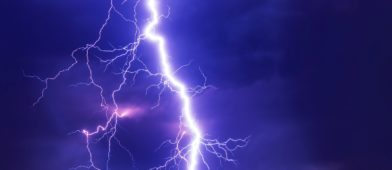When I was in elementary school, I remember watching a fire safety video. The video told us, all of eight years old at the time, that we needed a fire escape plan.

Come up with a fire safety plan kid, or you’ll die kid. Heavy stuff.
You needed to know what happens during a fire, how to check doors, how you’ll escape, and where you and your parents will meet up once you get out.
I still remember the answers. Touch the door with the back of your hand, then the back of the knob with the back of your hand, escape down the stairs, and then meet at our mailbox at the end of the driveway. I also remember that we didn’t have a window escape ladder and that if I was trapped in my bedroom, well, I’d be dead.
DEAD! eek!
We never had a fire, thankfully, and I never died. Whew!
I write that all tongue in cheek but it does illustrate something important that I’ve internalized – you should always have an emergency plan.
Years later, I would read Checklist Manifesto by Atul Gawande and learn the value of checklists, even basic ones, as a way of taking the decision making out of emergency responses.
When something unexpected happens on a plane, the pilots don’t think about what to do next, they follow a checklist. A checklist created by an experienced professional who isn’t panicking because one of the engines just went out.
What I’m proposing is that you, sitting in front of the computer shirking responsibilities at work, should create an emergency plan for you and your family. Or you die. (just kidding)
Table of Contents
How to Create Your Financial Emergency Plan
This is a two phase process:
- Write a list of major financial emergencies
- For each, create a checklist, with supporting data, for what you’ll do if it strikes
Identifying Major Emergencies
A major financial emergency is defined as anything that would cause you to dip into your emergency fund.
With that simple definition in mind, here are some common major emergencies:
- Death – Yours or a close loved one
- Loss of a job or ability to work due to disability
- Loss of use of your primary vehicle
- Catastrophic emergency home expense – major appliance failure or repair, water leak, roof leak, burglary.
- Natural disaster damage
- Medical or dental emergency
- Bereavement-related expense – funeral, travel costs
- Lawsuit
This is just a small list of the potential major emergencies in your life. You know your situation best, you should cover all the ones you’re likely to experience.
Creating Each Checklist
Now take one of the major emergencies and list the things you’d do in response. Let’s take the most catastrophic – the loss of your job.
What would you do?
- Cut all non-essential expenses – List all of the recurring expenses and the process for cancelling.
- Downgrade non-essential un-cuttable expenses – Some recurring expenses cannot be cut, figure out how to downgrade them to save money.
- Prioritize bills – Now that you know your fixed expenses, begin prioritizing your bills in case you can’t pay them all.
- Rework your budget – Now that your income has fallen, it’s time to rework your budget. If you don’t have a budget, you need one now.
- Apply for government benefits – Collect the address of the local state unemployment office and any pertinent information you need to file a claim.
- Call a family meeting – Prepare in advance what you want to discuss.
- Get health insurance – You will have access to COBRA for a short time, but is it the right option? Should you consider the Affordable Care Act? What are your options?
- Establish an approach for getting a new job – Update your resume (you should be doing this every 6-12 months anyway), network, etc.
- Establish a short-term Plan B (part-time) job – You’ll only receive so much in unemployment benefits, is there a stop gap job you can get to draw income while you continue to search.
- Establish what you’ll do in the downtime – Exercise, might as well get fitter with all this time you have.
You don’t have to fully research every line item but you should have every line item listed.
Creating a checklist has two valuable benefits:
First, you simulate your response. You can plan your response without the stress. This is a very powerful exercise because you’ll be able to formulate a better checklist if you aren’t panicking at the same time.
Second, now you have a list of things to do along with the information you need. If you do lose your job, you don’t have to search for it.
Take filing for unemployment, the first result for “filing for unemployment in MD” leads me to a page on the Maryland Department of Labor’s site that says “The How to Apply for Maryland Unemployment video is not available. To obtain additional guidance regarding filing for Unemployment Insurance, please check out our Claimant Frequently Asked Questions (FAQs) or contact the Claimant Information Service.”
Great. Thanks, Maryland. If I was upset I lost my job, now I’d be upset at the incompetence of whoever is running this site. When you’re calm, you see that page and you think – “eh, onto the next one.” When you’ve just lost your job, you’re not in the right emotional state.
The next result gives me a page that lists the location of every state unemployment office, the Maryland Unemployment website (mdunemployment.com), as well as eligibility information. I know now that I can file Monday through Friday, 8 AM – 3 PM, or by Internet anytime… if that website worked. After a few tries of the website, I learned it was just a redirect to this page – http://www.labor.maryland.gov/employment/unemployment.shtml – so now I put that URL in my emergency plan.
Once you’ve created each checklist, store the whole document in a safe place, and review it once a year. I keep mine with my Treasure Map.
Build It Piece by Piece
Collecting the information for each financial emergency is time-consuming. Start with the highest probability, highest-impact items first.
If you are in a stable job with long term career prospects, building the “Job loss” checklist is a lower priority than “loss of use of your primary car.” Work on the car breakdown list first, since you’re more likely to get into a situation where you lose your car.
If you break up the work, it makes it a less daunting a task. You don’t need every answer right away, just take a few minutes each week to throw some items in a list and do some preliminary research.
There are also some things you can do to prevent disasters in the first place. Check out these financial safety nets.
Write Down Post-Disaster Debriefs
Over New Year’s 2018, we had a pipe burst in our home. It flooded several parts and it was tens of thousands of dollars of damage.
We discovered it after our annual four day trip to Deep Creek, MD with our college friends. When we got home, after dropping the kids off at daycare and school, we walked into a disaster. Fortunately, no one was hurt. Areas of the home were damaged but it was still livable, we still had all of our major systems, and we were able to mitigate the damage somewhat because we knew how to turn off the water without having to search in a panic.
What we didn’t know was what to do next – we had to guess. Our first call was to our homeowner’s insurance company (State Farm) and then our second was to several water mitigation companies to see who would come out first. Mold starts to become a problem very quickly and you want to dry things out as quickly as possible. Our only previous experience with water was a burst well pipe going into the home, but that just flooded an unfinished crawlspace.
As I’m updating this post, in March of 2018, we are still working with the insurance company (just getting things approved, they are not being difficult by any means) while contractors are performing the repairs on the home.
We are documenting the experience for our records so we have an idea of what to do if this happens again. Hopefully, it won’t… but if it does, we’ll know what to do.
Do you have a Financial Emergency Plan?




Still amazes me that schools teach the basic safeties of life, like first safety, but fail to cover financial safety. Life happens and you need to be prepared. We have an emergency fund and check list in place.
Schools teach you how to get into college, that’s pretty much it. College teaches you something specialized. Along the way, no one teaches you the basics about a lot of LIFE things from finances to fitness.
I learned about life through experiences + reading a heck of a lot of books. You’re so right. School doesn’t prepare you for a well-rounded, fulfilling life. I almost wish I would have skipped classes in high school and just self-taught some days. It would have been a better use of my time than most days in high school. Note: I was an A student, teachers liked me, I had lots of friends but I still think HS could be GREATLY improved.
High school prepares you for college and does very little else. All the “life skills” stuff has been phased out and we’re left with strong “academics” but poor life preparation.
Well said. I like the saying, ‘Knowledge without action is useless.’ That’s kind of how high school felt. Lots of knowledge gained but little practical application. Thus, a lot of it was near useless.
Yeah, though I’m glad I didn’t have to use any of the earthquake or fire drill information though!
I agree, but both school and college teach the children discipline, and having the right attitude when they start dealing with life and work.
I would agree that college does, schools in the US don’t really teach that much discipline. 🙂
If you never have an emergency during your life you will be the first person in history, so might as well pretend to be prepared for it. Not if, just when. Having a credit card doesn’t mean you have an emergency fund.
Yes! A credit card is a useful tool in dealing with emergencies as it can give you access to immediate funds, but the cost is great if you don’t have the funds behind it to pay it off. High interest debt is like an infection, it can take a small emergency and make it a serious one.
That fire safety video was on to something – when the stakes are do this or die, you do it. We have to raise the financial stakes!
The stakes are already high, the awareness is what’s lacking! We have to raise the financial stakes awareness! 🙂
I could not agree more re: your response to Stefanie that we need to raise the financial stakes awareness. Whether it be due lack of financial literacy or the “It’s going to happen to someone else” mindset they simply need to be raised. We established our plan about 10 or so years ago and really got streamlined when I left my job 4 years ago. It allowed us to see more tangibly what we really need to get by, how we cover things and steps we would need to take. Love the exercise tip as well – I’m sure there… Read more »
I strongly believe most people don’t do this because it forces you to think about something bad. Losing a job sucks, figuring out what you have to do afterwards is a lot like admitting you might lose your job. It’s like a pre-nuptial agreement, it’s like admitting your marriage might not work out.
Sadly, life happens and bad stuff happens. Not thinking about it doesn’t make it less likely, even if it does make you feel more comfortable about the probabilities.
Any advice for those who have been turned down for disability and life insurance and can’t get coverage through work? Sure, I can save on my own, but it would never be enough to replace my income for my family should I die or need constant care.
Wendy, If you’ve been turned down for life insurance and disability insurance and you don’t have options for group coverage, your options are really limited. But here are a couple of tips: 1. Shop aggressively with multiple insurance brokers. I got life insurance for a client who had multiple heart surgeries a few years ago after several brokers had failed. Listen to this podcast episode for some inside industry info: http://radicalpersonalfinance.com/204-a-behind-the-scenes-look-into-high-risk-life-insurance-underwriting-interview-with-todd-simpson-clu-chfc-from-the-stamm-agency/ 2. Get some basic “guaranteed issue coverage” to provide a little bit of cash if you die. Premiums are high but it’ll provide a little liquidity while you’re saving… Read more »
A great and thorough answer as always Joshua, thank you for chiming in!
Hey Jim,
This is an awesome checklist. It’s so important to have a set plan for situations like this. Plus, I hate the idea of putting more in my emergency fund than necessary, because I can be investing it. Once you have a plan in place, you can rest easy knowing that you have enough to cover anything that could come up. I’ll be sharing this for sure!
Cheers,
Kalen
Thanks Kalen – and a plan is so important but so underutilized.
Thank you for raising this! It’s far too easy and too tempting to keep our heads in the sand and pretend bad things will never happen to us. We have a number of plans in place — from life insurance, estate documents and online records of all of our belongings, to a robust emergency fund and “go bags” in the house and cars. I don’t think you necessarily need to make a detailed plan for every possible emergency scenario, but cover the basics. And mapping out a detailed strategy for one or two major emergencies (in our case, wildfires are… Read more »
I agree that 100% detailed may be too much, especially if you’re very detailed in some at the cost of outlining other scenarios. We all know the likely emergencies, which is why wildfires for you could be flooding for someone else, we each need to plan for our own set of emergencies. Great point!
It’s funny what sticks with us as kids sometimes. After you mentioned the fire drill videos, I suddenly remembered all kinds of drills I became accustomed to growing up with in the 80’s in Cali. I had to prepare for fires, earthquakes, and even nuclear fallout! Whew. It was a stressful time back then. 🙂 Of course, preparation and planning were always key to riding out any disaster that came our way. And, managing for financial emergencies is no different. So, I really like your simple checklist to address potential fallout and actionable steps to take in the event you… Read more »
I think it’s because people are busy and don’t see these emergencies as likely, whereas the stresses of work the next day are likely. Then there’s a bit of “I don’t want to deal with it” out of fear. Human psychology is fascinating because we know that planning will help us handle emergencies better but thinking about it makes us uncomfortable so it’s easy to avoid it.
It’s one thing to save for financial emergencies (i.e. an emergency fund), but how you react to financial emergencies is also important. Even when you have the money set aside for such an emergency, you still need to figure out how to manage your time and expenses. Your checklist provides that guidance to get through similar financial emergencies.
Exactly! The money is certainly very important but your reaction is just as important, you could rush to a bad decision under pressure.
This is a very informative post that reminds me that we do not have a fire escape plan 😉
But we do have a financial emergency plan. This touches on some big life events that can cause a big financial struggle with families. I actually know a family that recently built a new home with two incomes and now there has been a big change in companies and the one income will be lost. Things do happen and having a back up plan can relieve a bit of stress.
I never did have a ladder for my room and I’m fine… so there’s that. 🙂